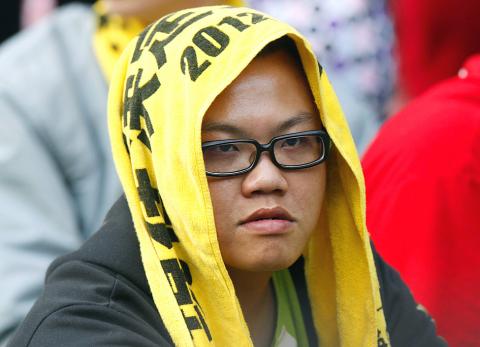The Democratic Progressive Party (DPP) suffered a surprisingly large defeat yesterday in a presidential election that was expected to be a neck-and-neck race as DPP presidential candidate Tsai Ing-wen (蔡英文) failed to keep President Ma Ying-jeou (馬英九) of the Chinese Nationalist Party (KMT) from winning a second term.
Tsai, who aspired to become the first female president in Taiwan’s history, garnered 45.63 percent of the total votes, while Ma received 51.60 percent.
At a post-election press conference, Tsai conceded defeat and offered her congratulations to Ma.

Photo: Shengfa Lin, Reuters
“I respect the decision of the people and offer my congratulation to President Ma. However, I urge him to listen to the voice of the people in the next four years and not to let the public down,” she said.
Despite the DPP making progress in terms of its share of the vote and the number of seats the party claimed in the legislature, Tsai said the result showed that the party has a long way to go in central and northern Taiwan.
Saying that she took full responsibility for the loss, Tsai also announced her immediate resignation as party chairperson, before making a speech to thousands of supporters outside her campaign headquarters in Banciao District (板橋), New Taipei City (新北市).

Photo: Shengfa Lin, Reuters
“It’s unfortunate we were not able to complete the last mile. We lost the election, but we also won something — solidarity and the determination to reform. The next DPP chairperson will keep the fire of reform burning,” she told supporters, who chanted: “Stay. Stay.”
Tsai called on her supporters to stick together because “someday, we will be back again.”
The loss was another blow to the party, which lost a landslide presidential election four years ago when its presidential candidate Frank Hsieh (謝長廷) only garnered 41.55 percent of the total vote against Ma’s 58.45 percent.

Photo: Shengfa Lin, Reuters
The 2008 loss came after the DPP’s historic victory in 2000 by then-presidential candidate Chen Shui-bian (陳水扁), in which the party ended the KMT’s dominance and achieved the nation’s first transfer of power. Chen also won re-election in 2004.
Tsai was able to pull the party together and she started its journey back to being a competitive party with a number of by-election victories after assuming the chairmanship in 2008 en route to her nomination as the DPP’s presidential candidate in April last year.
She was able to pick up momentum as the campaign progressed with her campaign theme, which highlighted fairness and justice, as well as social and economic issues, such as income inequality and unemployment.
The DPP predicted Tsai would win by 1 percent, or about 100,000 votes, in the hotly contested election in its last survey before the election.
Supporters began to arrive at Tsai’s national campaign headquarters in a confident mood yesterday afternoon for an open-air rally, where a giant screen was set up so people could watch the live telecast of the ballot counting, which began at 4pm.
A few hundred people packed a small area inside the headquarters to watch the telecast. The crowd cheered when the initial vote count showed Tsai leading the national tally in the first few minutes.
However, the mood failed to last after almost every television station showed Ma pulling away and increasing his lead to more than 300,000 votes after about 30 minutes.
Watching the TV broadcast, a DPP aide said he was concerned about the share of the vote of People First Party (PFP) Chairman James Soong (宋楚瑜), whose share consistently stayed below 3 percent, about half of his support rate before the election.
“That showed that strategic voting has occurred as voters decided to ‘dump’ Soong and vote for Ma,” he said.
Another senior DPP aide, who had been monitoring the official Central Election Commission (CEC) real-time vote tally, said that the tallies shown on television did not reflect the official vote count.
According to the CEC, Ma did not pull his lead out to more than 3 percent until about 7pm, three hours after the beginning of the count, while almost all television channels showed that Ma was in the driver’s seat after the first 30 minutes.
Chuang Ruei-hsiung (莊瑞雄) and Lin Chun-hsien (林俊憲), the hosts of the DPP’s rally, tried to pump up the crowd, but their announcement of the party’s legislative election victories in local constituencies failed to brighten the mood of supporters, most of whom stood silently in a light shower.
Some young DPP staffers and volunteers hugged each other, sobbing outside the party’s headquarters long before the outcome was announced.
Meanwhile, People First Party (PFP) supporters gathered at the party’s headquarter in Taipei and cheered in consolation for PFP Chairman James Soong (宋楚瑜), who lost his presidential bid and trailed far behind with 2.77 percent of the vote.
“Go, governor Soong. We are still proud of you despite the failure,” a supporter shouted.
Soong said he did not start considering joining the election until July or August last year, after feeling the need to speak out for ordinary people and improve their lives.
Soong said that his campaign lacked funds and he was thankful that the party was able to gather so many small donations from supporters.
“We accept the people’s decision,” he said.
Additional reporting by Shelley Shan

A preclearance service to facilitate entry for people traveling to select airports in Japan would be available from Thursday next week to Feb. 25 at Taiwan Taoyuan International Airport, Taoyuan International Airport Corp (TIAC) said on Tuesday. The service was first made available to Taiwanese travelers throughout the winter vacation of 2024 and during the Lunar New Year holiday. In addition to flights to the Japanese cities of Hakodate, Asahikawa, Akita, Sendai, Niigata, Okayama, Takamatsu, Kumamoto and Kagoshima, the service would be available to travelers to Kobe and Oita. The service can be accessed by passengers of 15 flight routes operated by

GIVE AND TAKE: Blood demand continues to rise each year, while fewer young donors are available due to the nation’s falling birthrate, a doctor said Blood donors can redeem points earned from donations to obtain limited edition Formosan black bear travel mugs, the Kaohsiung Blood Center said yesterday, as it announced a goal of stocking 20,000 units of blood prior to the Lunar New Year. The last month of the lunar year is National Blood Donation Month, when local centers seek to stockpile blood for use during the Lunar New Year holiday. The blood demand in southern Taiwan — including Tainan and Kaohsiung, as well as Chiayi, Pingtung, Penghu and Taitung counties — is about 2,000 units per day, the center said. The donation campaign aims to boost

ENHANCING EFFICIENCY: The apron can accommodate 16 airplanes overnight at Taoyuan airport while work on the third runway continues, the transport minister said A new temporary overnight parking apron at Taiwan Taoyuan International Airport is to start operating on Friday next week to boost operational efficiency while the third runway is being constructed, the Ministry of Transportation and Communications said yesterday. The apron — one of the crucial projects in the construction of the third runway — can accommodate 16 aircraft overnight at the nation’s largest international airport, Minister of Transportation and Communications Chen Shih-kai (陳世凱) told reporters while inspecting the new facility yesterday morning. Aside from providing the airport operator with greater flexibility in aircraft parking during the third runway construction,

MORE FALL: An investigation into one of Xi’s key cronies, part of a broader ‘anti-corruption’ drive, indicates that he might have a deep distrust in the military, an expert said China’s latest military purge underscores systemic risks in its shift from collective leadership to sole rule under Chinese President Xi Jinping (習近平), and could disrupt its chain of command and military capabilities, a national security official said yesterday. If decisionmaking within the Chinese Communist Party has become “irrational” under one-man rule, the Taiwan Strait and the regional situation must be approached with extreme caution, given unforeseen risks, they added. The anonymous official made the remarks as China’s Central Military Commission Vice Chairman Zhang Youxia (張又俠) and Joint Staff Department Chief of Staff Liu Zhenli (劉振立) were reportedly being investigated for suspected “serious